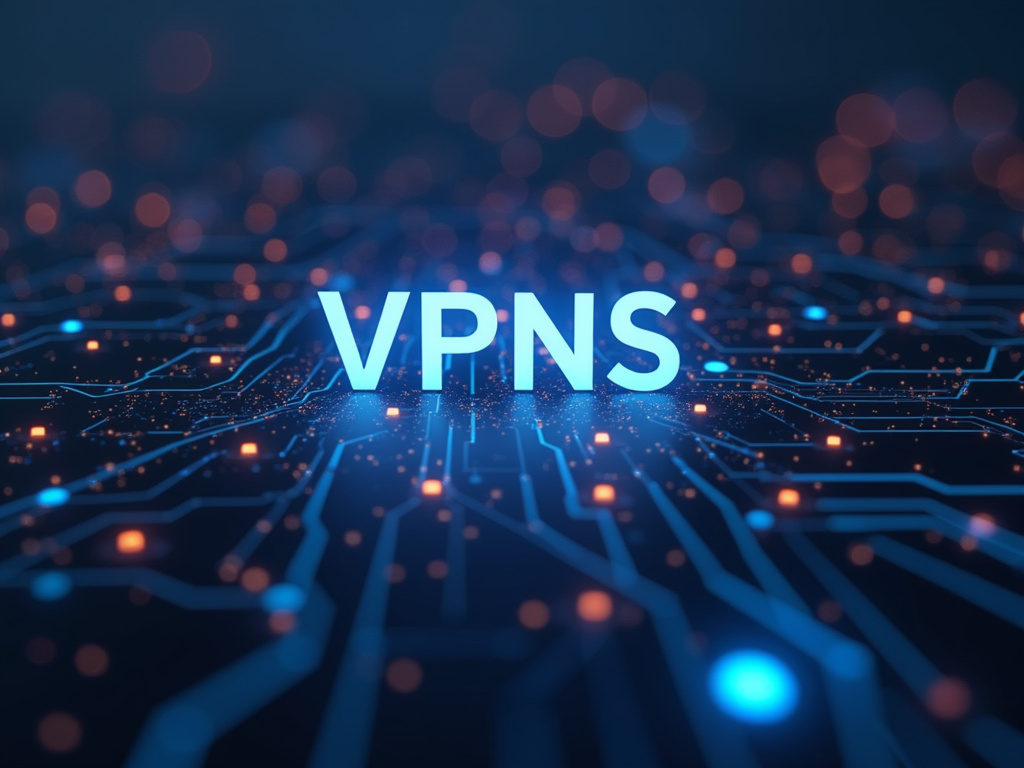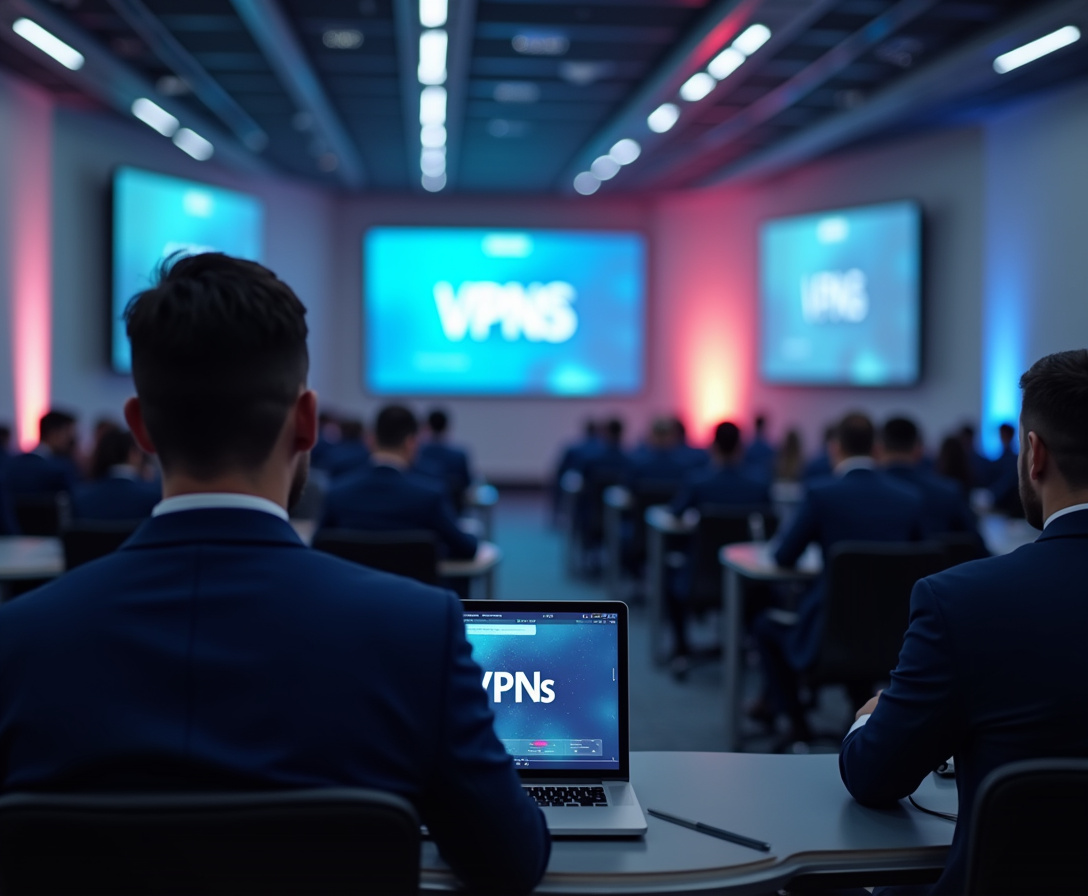VPNs for Virtual Conferences: Ensuring Secure Networking

Table of Contents
Securing Your Virtual Presence: The Importance of VPNs at Conferences
The digital age has ushered in a new era of connectivity, with virtual conferences becoming an increasingly popular and effective platform for knowledge sharing, networking, and collaboration. These virtual gatherings transcend geographical boundaries, offering accessibility and convenience that traditional in-person events simply cannot match. However, this digital migration also introduces significant security concerns that must be addressed to ensure the integrity, privacy, and success of these virtual conferences.
One of the most crucial safeguards in this digital landscape is the implementation of a Virtual Private Network (VPN). This article delves into the essential role of VPNs in securing virtual conferences, exploring how they protect sensitive data, fortify networking opportunities, and ensure a safe and productive environment for all participants. A virtual conference VPN is more than just a piece of software; it's a comprehensive security solution designed to create a secure, encrypted tunnel for data transmission, effectively shielding participants from a myriad of cyber threats that lurk in the online world.
The open and often unsecured nature of the internet leaves virtual conferences vulnerable to eavesdropping, data breaches, malware attacks, and other malicious activities. A VPN acts as a protective barrier, masking the user's IP address, encrypting their data, and routing their internet traffic through a secure server, effectively anonymizing their online presence. This makes it significantly more difficult, if not impossible, for cybercriminals to track their location, identify their device, or intercept their sensitive information.
The application of a virtual conference VPN is broad. The encryption process employed by a VPN transforms data into an unreadable format, rendering it incomprehensible to anyone who might intercept the connection without the proper decryption key. This is particularly critical during virtual conferences where participants may be sharing sensitive information such as financial details, intellectual property, personal data, or confidential business strategies.
Furthermore, a VPN can effectively bypass geographical restrictions, allowing participants from around the globe to access conference content without limitations imposed by regional firewalls or censorship. One of the core strengths of a VPN lies in its ability to bolster networking security. Virtual conferences are designed to facilitate connections and collaborations between participants, and a VPN ensures that these interactions are secure and private.
Public Wi-Fi networks, often found in hotels, airports, cafes, and even co-working spaces, are notorious for their lack of security, making them easy targets for hackers. Connecting to a VPN before joining a virtual conference ensures that all data transmitted over these networks is protected, preventing cybercriminals from intercepting sensitive information or conducting man-in-the-middle attacks. In addition to individual protection, a VPN also plays a crucial role in safeguarding the virtual conference platform itself.
Distributed Denial of Service (DDoS) attacks, which aim to overwhelm a server with traffic and disrupt its services, are a common threat to online events. A VPN can help mitigate these attacks by masking the server's IP address, distributing traffic across multiple servers, and filtering out malicious requests. This ensures that the conference platform remains accessible and functional, even in the face of a cyberattack.
When selecting a VPN for a virtual conference, several factors need to be taken into account. These include the number of participants, the bandwidth requirements of the conference platform, the desired level of security, and the compatibility of the VPN with various devices and operating systems. It is essential to choose a VPN provider with a proven track record of reliability, security, and performance.
Look for providers that offer strong encryption protocols, a wide range of server locations, a strict no-logs policy, and 24/7 customer support.
Data exchange protection stands as a cornerstone of ensuring secure participation and collaboration within virtual conferences. These digital events often involve the sharing of confidential information, collaborative project development, and the exchange of sensitive documents. Without robust security measures, this valuable data becomes vulnerable to interception, unauthorized access, or outright compromise.
A well-configured virtual conference VPN acts as a bulwark, encrypting all data transmitted between participants and the conference server, rendering it unreadable to any unauthorized parties who might attempt to eavesdrop. This encryption process is not merely a technical formality; it's a vital safeguard for protecting intellectual property, safeguarding financial data, and maintaining the confidentiality of other sensitive information that is crucial to the operations and reputations of the individuals and organizations involved. Beyond simple encryption, a VPN can also effectively prevent man-in-the-middle attacks, a particularly insidious form of cybercrime wherein malicious actors intercept communication between two or more parties, with the goal of stealing sensitive data or injecting malicious code into the communication stream.
By establishing a secure and encrypted tunnel, a VPN ensures that all communication remains private and protected from these types of attacks, creating a safe environment for open discussion and collaboration. Further to the guarantee of privacy, data exchange protection must also include a focus on the integrity of the data itself. A VPN can verify that the data received is precisely the same as the data sent, guarding against tampering or corruption that could compromise the accuracy and reliability of the information being exchanged.
This is of paramount importance when sharing critical documents, collaborating on complex projects, or making important decisions based on the information being presented. When evaluating VPN options, look for those that utilize strong encryption protocols, such as AES-256, and offer features such as data integrity checks. These measures provide assurances that your data remains unaltered and secure throughout the transmission process.
It's equally important to choose a VPN provider that adheres to a strict no-logs policy, meaning that they do not store any information about your online activity, including browsing history, connection times, or IP addresses. This ensures that your data remains private even from the VPN provider itself, adding an extra layer of protection against potential breaches or surveillance. Data exchange protection also extends to the security of the virtual conference platform itself.
The platform should implement a layered security approach, including robust encryption, stringent access controls, and sophisticated intrusion detection systems. A VPN acts as a complementary layer of defense, ensuring a secure connection for participants accessing the platform. In addition to security features, consider using a VPN with functionalities like split tunneling.
This feature allows you to selectively route specific traffic through the VPN while allowing other traffic to bypass it. This can improve performance and reduce bandwidth consumption for less sensitive activities, while maintaining robust security for data exchange within the conference. Finally, it's worth noting that a comprehensive data exchange protection strategy must also encompass participant education.
Virtual conference organizers should provide clear instructions on how to use the VPN properly, emphasizing the importance of protecting sensitive information and raising awareness of potential cyber risks. This proactive approach empowers participants to take the necessary precautions and contribute to a culture of security within the virtual conference environment. By implementing these comprehensive measures, virtual conference organizers can cultivate a secure, trustworthy environment where participants can connect, collaborate, and exchange information with confidence, knowing that their data is safeguarded every step of the way.
This will contribute significantly to the overall success of the event, generate trust among participants and sponsors, and strengthen the reputation of the organization hosting it.
Interaction security stands as a non-negotiable aspect of successful virtual conferences, dictating the extent to which participants can confidently engage, collaborate, and exchange ideas without fear of intrusion or data compromise. A virtual conference VPN is a crucial instrument in upholding the sanctity and confidentiality of these interactions, creating a digital space where meaningful connections can flourish without the looming threat of cybercrime. One of the primary concerns surrounding interaction security centers on safeguarding voice and video communication.
In virtual conferences, these channels serve as the nerve center for discussions, presentations, and real-time collaborations. It is thus paramount to ensure these communications do not become the target of interception and eavesdropping. The encryption provided by a VPN scrambles the audio and video data, rendering it unintelligible to any unauthorized parties attempting to intercept it.
A weakness in these communication channels could expose sensitive business strategies, personal opinions, or confidential information, potentially resulting in significant reputational or financial damage. In tandem with securing communication channels, it is vital to protect against identity theft and impersonation. Virtual conferences are inherently vulnerable to malicious actors creating fake profiles to gain unauthorized access, spread misinformation, disrupt discussions, or even engage in corporate espionage.
A VPN can significantly mitigate this risk by masking participants' IP addresses, making it far more difficult to trace their online activity or create convincing fake profiles. Coupled with robust registration processes, the masking offered by a VPN creates a stronger barrier against malicious infiltration. Furthermore, the implementation of strong authentication measures, such as multi-factor authentication (MFA), is essential to verify the identity of participants accessing virtual conference sessions.
MFA adds an extra layer of security by requiring users to provide multiple forms of identification before granting access, significantly reducing the risk of unauthorized entry. Extending the theme of interaction security, the protection of chat rooms and messaging platforms commands equal attention. These channels often serve as hubs for informal discussions, Q&A sessions, and ad-hoc networking opportunities.
A VPN effectively encrypts messages sent through these platforms. This prevents them from being read by unintended recipients, and safeguards sensitive information shared in candid exchanges. In parallel with technological safeguards, human oversight remains vital; designated moderators should diligently monitor chat rooms for inappropriate behavior, spam, or any indication of malicious activity.
Furthermore, it is essential to establish clear rules of engagement and community guidelines for chat room participation, fostering a culture of respect and responsible communication. The secure sharing of digital files represents another critical facet of interaction security. Throughout virtual conferences, participants routinely exchange documents, presentations, and other files.
To prevent unauthorized access or data breaches, these files should be encrypted both during transmission and when stored at rest. A VPN secures files during transmission by encrypting the data stream. This is further enhanced by encryption software protecting files stored on participants' systems.
In addition to these measures, it is important to implement access controls to ensure that only authorized individuals can access sensitive files. Permissions management and digital watermarking can further aid in tracking and protecting proprietary documents. Alongside these technological fortifications, a clear and readily accessible code of conduct is essential.
Participants should be thoroughly informed about the ever-present risks of cybercrime and comprehensively guided on actionable strategies for protecting themselves while interacting. Virtual conference hosts should also formulate a meticulously crafted response plan. This should outline the immediate steps to be taken should a security incident occur.
By proactively fortifying interaction security, virtual conference organizers can foster an atmosphere of confidence and trust. This nurtures deeper engagement and collaboration among participants, fostering a more enriching and impactful virtual event.
Enhancing Service Security: VPNs for Platform Providers and Subscribers
Selecting the Right VPN for Your Virtual Conference: A Strategic Approach Choosing the most appropriate VPN for a virtual conference demands a careful and strategic approach, taking into account the unique needs and characteristics of the event. A one-size-fits-all solution simply won't suffice; the chosen VPN must align with the conference's scale, technical infrastructure, and security requirements. One of the primary considerations is the number of participants.
A VPN designed for individual use may not be able to handle the bandwidth demands of a large-scale virtual conference with hundreds or even thousands of attendees. It's crucial to select a VPN provider that offers scalable solutions capable of accommodating the expected traffic volume without compromising performance or security. Bandwidth considerations extend beyond just the number of participants; they also encompass the types of activities taking place during the conference.
Virtual conferences often involve high-bandwidth activities such as video streaming, screen sharing, and large file transfers. The VPN must be able to handle these demands without causing lag, buffering, or other performance issues. Look for VPN providers that offer high-speed servers and optimized network infrastructure to ensure a smooth and seamless experience for all participants.
Security is, of course, a paramount concern when selecting a VPN for a virtual conference. The VPN should employ strong encryption protocols, such as AES-256, to protect data in transit. It should also offer features such as a kill switch, which automatically disconnects the user from the internet if the VPN connection drops, preventing unencrypted data from being transmitted.
A strict no-logs policy is also essential to ensure that the VPN provider does not store any information about your online activity. In addition to these core security features, it's important to consider the VPN provider's reputation and track record. Look for providers that have a history of providing reliable and secure service, and be wary of VPNs that make unrealistic claims or have been involved in security breaches.
Compatibility is another key factor to consider. The VPN should be compatible with the devices and operating systems used by the majority of conference participants. It should also be easy to install and configure, even for users with limited technical expertise.
Many VPN providers offer dedicated apps for various platforms, making it easy for users to get started. Server location is also an important consideration, particularly if the virtual conference has participants from around the world. The VPN should have servers located in multiple countries to ensure that users can connect to a server that is geographically close to them, minimizing latency and improving performance.
The user interface (UI) and overall user experience (UX) of the VPN client should also be factored into the decision-making process. A well-designed UI can significantly simplify VPN usage, especially for attendees with limited technical background. An intuitive interface coupled with clear instructions will encourage wider adoption of the VPN, enhancing the overall security posture of the conference.
Cost considerations also need to be balanced against the features and performance offered by different VPN providers. While free VPNs may seem attractive, they often come with significant limitations, such as limited bandwidth, slower speeds, and weaker security. It's generally advisable to opt for a paid VPN service from a reputable provider to ensure a secure and reliable experience.
Consider the level of technical support offered by the VPN provider. In the event of technical issues, it's important to have access to prompt and knowledgeable support to resolve the problem quickly. Look for VPN providers that offer 24/7 customer support via email, phone, or live chat.
Finally, it's worth considering whether the VPN provider offers any features specifically designed for businesses or organizations, such as centralized management tools, dedicated IP addresses, or priority support. These features can be particularly valuable for virtual conferences with a large number of participants or complex security requirements. By carefully considering these factors, you can select a VPN that is tailored to the specific needs of your virtual conference, ensuring a secure, reliable, and productive event for all participants.
Future-Proofing Security: The Evolving Role of VPNs in Subscription Services
Best Practices for Effective VPN Configuration and Maintenance in Virtual Conferences Once a suitable VPN has been selected for the virtual conference, proper configuration and ongoing maintenance are crucial to ensuring its effectiveness and maximizing its security benefits. A haphazardly implemented or poorly maintained VPN can create a false sense of security, leaving the conference vulnerable to cyber threats. One of the first steps is to establish clear VPN usage guidelines and policies for all participants.
These guidelines should outline the purpose of the VPN, the types of activities that should be conducted while connected to the VPN, and any restrictions on its use. It's also important to provide participants with clear instructions on how to install, configure, and use the VPN properly. This will help ensure that everyone is on the same page and using the VPN in a secure and consistent manner.
Implement centralized VPN management: For larger virtual conferences, consider using a VPN solution that allows for centralized management of user accounts and VPN settings. This allows administrators to easily deploy the VPN to all participants, enforce security policies, and monitor VPN usage. Centralized management can also simplify troubleshooting and provide a more consistent security experience for all users.
Enforce strong password policies: Encourage participants to use strong, unique passwords for their VPN accounts to prevent unauthorized access. Consider implementing multi-factor authentication (MFA) for an extra layer of security. MFA requires users to provide multiple forms of identification, such as a password and a code sent to their mobile device, making it much harder for attackers to gain access to their accounts.
Regularly update the VPN software: VPN providers regularly release updates to their software to fix bugs, improve performance, and address security vulnerabilities. It's important to ensure that all participants are using the latest version of the VPN software to protect against known threats. Consider using a VPN solution that automatically updates the software in the background to minimize the burden on users.
Monitor VPN usage for suspicious activity: Regularly monitor VPN logs for any signs of suspicious activity, such as unusual connection patterns, failed login attempts, or connections from unexpected locations. This can help you detect and respond to potential security threats before they cause damage. Implement intrusion detection and prevention systems to automatically detect and block malicious traffic.
Educate participants about phishing and social engineering attacks: Phishing and social engineering attacks are a common way for attackers to steal VPN credentials or trick users into installing malware. Educate participants about these types of attacks and provide them with tips on how to avoid becoming a victim. Encourage participants to be wary of suspicious emails, links, and attachments, and to never share their VPN credentials with anyone.
Conduct regular security audits: Regularly conduct security audits of your VPN infrastructure to identify and address any potential vulnerabilities. This should include testing the VPN's encryption strength, access controls, and logging mechanisms. Consider hiring a third-party security firm to conduct an independent audit.
Establish a security incident response plan: In the event of a security breach, it's important to have a plan in place to respond quickly and effectively. This plan should outline the steps to be taken to contain the breach, investigate the incident, and notify affected parties. Regularly test the incident response plan to ensure that it is effective.
Stay up-to-date on the latest security threats: The threat landscape is constantly evolving, so it's important to stay up-to-date on the latest security threats and vulnerabilities. Subscribe to security newsletters, follow security blogs, and attend security conferences to stay informed. By following these best practices, you can maximize the security benefits of your virtual conference VPN and create a safe and productive event for all participants.
Consistent monitoring, coupled with a well-informed security posture, helps protect networking opportunities and ensures data exchange protection. By implementing these best practices, organizers reinforce interaction security and foster a secure virtual environment for optimal participant engagement.
Stay Updated
Get the latest VPN news, tips, and exclusive deals to your inbox.




